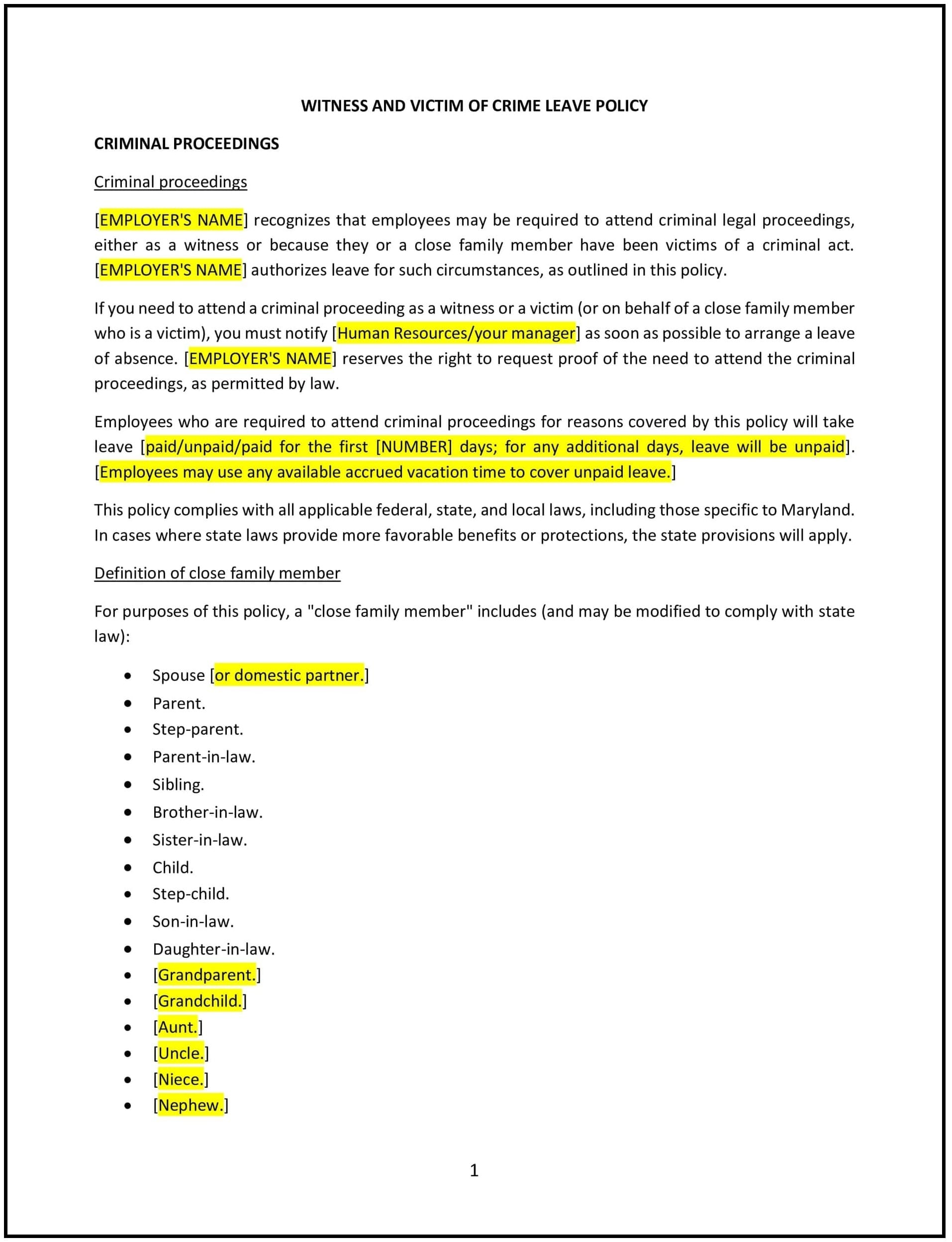Witness and victim of crime leave policy (Maryland): Free template
Got contracts to review? While you're here for policies, let Cobrief make contract review effortless—start your free review now.

Customize this template for free
Witness and victim of crime leave policy (Maryland)
This witness and victim of crime leave policy is designed to help Maryland businesses support employees who need time off to attend court proceedings as a witness or to handle personal matters related to being a victim of a crime. It outlines the process for requesting leave, the types of leave available, and the documentation required.
By adopting this policy, Maryland businesses can demonstrate their commitment to supporting employees facing legal challenges while maintaining fairness and consistency in leave management.
How to use this witness and victim of crime leave policy (Maryland)
- Define eligibility: Specify which employees are eligible for leave under this policy, including full-time, part-time, and temporary employees, and any requirements for duration of employment or service.
- Identify qualifying events: Clearly outline the types of crimes and legal proceedings that qualify for leave, such as being a witness in a criminal trial or attending court as a victim of a crime.
- Set documentation requirements: Establish guidelines for the types of documentation employees must provide when requesting leave, such as a subpoena, court summons, or police report.
- Specify paid vs. unpaid leave: Indicate whether the leave will be paid or unpaid, and clarify how it interacts with other leave types (e.g., vacation or sick leave).
- Provide the leave process: Describe how employees should request time off for crime-related leave, including notice requirements, the submission of documentation, and approval procedures.
- Reflect Maryland-specific considerations: Ensure the policy aligns with Maryland state laws, such as the Maryland Crime Victims’ Rights Act, and any other relevant legal obligations.
Benefits of using this witness and victim of crime leave policy (Maryland)
Implementing this policy provides Maryland businesses with several advantages:
- Supports employee well-being: Offers employees the time and flexibility to handle important legal matters without the added stress of work obligations.
- Promotes fairness: Ensures that employees who are witnesses or victims of crimes are treated fairly and consistently when requesting time off.
- Reduces legal risks: Helps businesses comply with Maryland laws regarding crime victim and witness protections, reducing the risk of legal issues or complaints.
- Enhances employee satisfaction: Demonstrates the company’s commitment to employee well-being and civic duties, fostering a supportive work environment.
- Aligns with Maryland regulations: Ensures compliance with state laws regarding crime victim leave, contributing to a safer and more supportive workplace.
Tips for using this witness and victim of crime leave policy (Maryland)
- Communicate the policy clearly: Ensure employees are aware of the policy and understand how to request time off for crime-related leave during onboarding or policy updates.
- Provide support: Offer assistance in navigating the leave process, particularly for employees who may be dealing with emotional or legal challenges.
- Document all leave requests: Keep accurate records of any crime-related leave taken by employees, including the type of leave, duration, and supporting documentation.
- Be consistent: Apply the policy fairly and consistently across all employees to prevent potential discrimination claims or confusion.
- Review regularly: Periodically update the policy to reflect changes in Maryland law or internal practices related to crime-related leave.